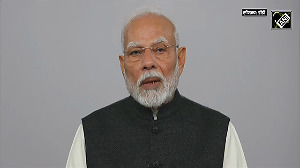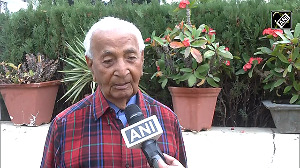The counsel for Hafiz Mohammad Saeed, chief of the banned Jamaat-ud-Dawah, today told a court hearing a petition challenging his detention that the group was not linked to the Taliban and that the UN Security Council had not asked Pakistan to detain its leaders.
Saeed's lawyer A K Dogar also told a three-member bench of the Lahore High Court, which is hearing a petition filed by Saeed and his aide Col (retired) Nazir Ahmed, that closing down all the JuD's public welfare programmes was unjustified.
Dogar said the JuD was not linked to Taliban and noted that the UN Security Council had only sought freezing of the accounts of the group while banning travel by its leaders and supply of weapons to the group.
He claimed that the UNSC had not directed the Pakistan government to detain any JuD leader. The bench asked Dogar to explain to what extent it was necessary to implement the Security Council's directions. He replied that the Security Council had passed resolutions on the Kasmir issue but they had not been implemented as yet.
The court later adjourned the hearing till tomorrow. Deputy Attorney General Malik Anayat will present his arguments at the next hearing.
On Tuesday, a three-member judicial review board of the Lahore High Court had ordered the release of two JuD leaders -Amir Hamza and Mufti Abdur Rehman - and extended the detention of Saeed and Ahmed by 60 days.
In the wake of the Mumbai terror attacks, the UN Security Council had declared JuD a front for a terror outfit.
JuD leaders were placed under house arrest on December 12 last year under the Maintenance of Public Order ordinance, which allows a person to be held for up to 90 days. The review board subsequently extended Saeed's detention twice.






 © 2024 Rediff.com -
© 2024 Rediff.com -